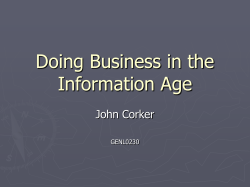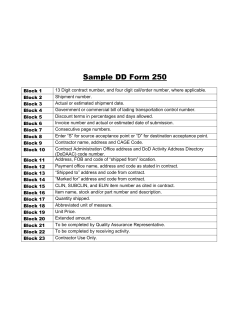
E97-110: Small Angle GDH Experimental Status Report Vincent Sulkosky
E97-110: Small Angle GDH Experimental Status Report Vincent Sulkosky Massachusetts Institute of Technology Hall A Collaboration Meeting June 9th, 2011 Introduction E97-110 Precision measurement of the moments of spin structure functions at low Q2, 0.02 to 0.24 GeV2 for the neutron (3He) Covered an unmeasured region of kinematics to test theoretical calculations (Chiral Perturbation theory) Complements data from experiment E94-010 covered region from 0.1 to 0.9 GeV2 Finalizing systematic uncertainties and first publication Neutron Spin Polarizabilities Experiment E97-110 3 Inclusive experiment: He ( e , e' ) X ◦ Scattering angles of 6◦ and 9◦ ◦ Polarized electron beam: Avg. Pbeam = 75% ◦ Pol. 3He target (para & perp): Avg. Ptarg = 40% Measured polarized crosssection differences M. Amarian et al., PRL 89, 242301 (2002) Kinematic Coverage Current Work Waiting on final target polarization (J. Singh) Elastic 3He analysis (V. Laine) ◦ 2.1 GeV asymmetry and cross section complete ◦ Now working on 2.8 GeV data set Finalize acceptance (V. Sulkosky) Radiative Corrections ◦ Preliminary done by J. Singh; code now available ◦ Tim Holmstrom working on it Estimation of QE contribution to neutron results (V. Sulkosky) Elastic Asymmetry Analysis Work by V. Laine` 3He Elastic Acceptance Delta tg ytg W-M tg Elastic Cross Section Analysis Average 10 A; VDC 19% multi-tracks Work by V. Laine` o 6 Acceptance Solutions • || 3.6% • Removed edge bins with a secondary process • Corrected remaining edge imperfections with a secondary acceptance correction 9o Acceptance Septum Mistuned 15% uncertainty More painful: ◦ Saturation effect is present ◦ A few settings were mistuned with the septum magnet ◦ tg-acceptance appears squeezed at the highest field settings Variation of Acceptance Cuts Varying acceptance cuts does not help Interpolation • || 3.6% • Removed edge bins with a secondary process • Corrected remaining edge imperfections with a secondary acceptance correction • The interpolation method works, but there is a concern about the adjacent momentum settings. • Currently working on Carbon cross section analysis to verify the absolute normalization of the data. Cross Section Smoothing 3.319 GeV, 9o Work by T. Holmstrom 4.404 GeV, 9o Summary Work is progressing though slowly Hope to wrap up acceptance analysis soon Major work needs to go into radiative corrections: 1. Smoothing of the data completed (T. Holmstrom) 2. Finite acceptance for elastic tail subtraction 3. Model for the two lowest energies Draft of first paper in progress (75% complete) and expect to be internally available this month Axial Anomaly and the LT Puzzle N. Kochelev and Y. Oh; arXiv:1103.4891v1 Systematic Uncertainties Analysis Status Preliminary results for the moments have been extracted at constant Q2. Collimator background is mostly from polarized 3He ◦ Need to estimate size of leakage into physics asymmetry Issues and analysis still in progress: ◦ Almost final target polarizations (J. Singh) Waiting to receive final numbers very soon. ◦ Elastic analysis as a cross check of systematics (V. Laine) 2.1 GeV completed; working on other energies now ◦ Acceptance: very messy but making steady progress ◦ Finalize radiative corrections (J. Singh, T. Holmstrom & V. S.) Updated SAMC Code Work done by V. Laine` SAMC rewritten in C++ from Fortran Improved implementation of target collimator cuts Raster correction by calculating electron’s travel length through the cell Radiative corrections made for each material separately (previously done all at once) Default units now in meter, gram, GeV and radian instead of cm and mrad Delta Acceptance E94-010 • Flat region of -acceptance is much smaller with Septum • Simulation is not perfect on the falling edges E97-110 9-Degree Acceptance More painful: ◦ Saturation effect is present ◦ A few settings were mistuned with the septum magnet ◦ tg-acceptance appears squeezed at the highest field settings
© Copyright 2025


















